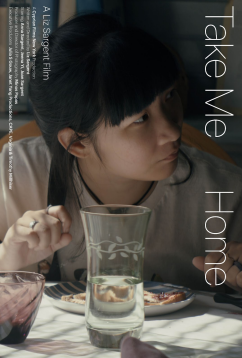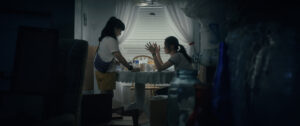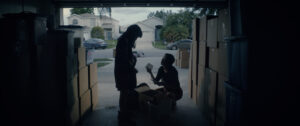 Written and directed by Liz Sargent, “Take Me Home” is a film that centers disability from the POV of the lead authentic character, Liz’s sister Anna Sargent. Filmed in Orlando, with local crew and in the home of their parents, “Take Me Home” will screen twice at the Florida Film Festival, and I had an opportunity to ask a few questions to Liz’s sister Molly Jordan, who is Associate Producer/Education Director for the film as well as Co-Guardian to Anna.
Written and directed by Liz Sargent, “Take Me Home” is a film that centers disability from the POV of the lead authentic character, Liz’s sister Anna Sargent. Filmed in Orlando, with local crew and in the home of their parents, “Take Me Home” will screen twice at the Florida Film Festival, and I had an opportunity to ask a few questions to Liz’s sister Molly Jordan, who is Associate Producer/Education Director for the film as well as Co-Guardian to Anna.
Chris Crespo: As this film makes its way around film festivals, what is the one thing you want audiences to take away from it at the very least?
Molly Jordan: I want people to see the range of emotions, human capabilities and spirited strength and resilience of Anna. I hope this opens dialogue and hearts to have a broader and more expansive view of people with disabilities so that there’s more love, tolerance, and acceptance for these marginalized communities. I also hope that though it’s important to understand the differences amongst this community that there’s far more commonalities that link us all. If we come from seeking to understand before being understood, open mindedness before judgement and love, compassion and empathy, our canvas is far more interesting, vibrant and complex.
CC: In sharing this story, what has been the response so far from the disabled community? I’m sure it must be empowering for people to see themselves reflected in your film, caretakers and guardians included.
MJ: Having been a public educator for 20+ years, I have a strong passion for equity, diversity and inclusion work where all people feel valued, honored and celebrated. It has been an honor and privilege to share a story from the POV of the cognitively disabled character (which is rarely on film.) Beyond the representation and inclusion of Anna within the disabled community, it’s been overwhelming and heartening to see the response from families with a disabled family member, and overall audience’s connection to future planning and caregiving that we reckon with as our parents age. The universal themes of healing, communication and moving forward together have struck a chord with audiences. People fall in love with Anna and her story. She shows the nuances of her disability, her abilities beyond when empowered, her insecurities and her beauty that cannot and will not be dimmed by society’s expectations, assumptions and stereotypes.
As the Education Director, I’ve had the pleasure of meaningful conversations with fellow film festival programmers, universities and non-profits that have a strong affinity with the themes in “Take Me Home.” This has broadened the landscape, scope and impact beyond the film by forming partnerships, community and conversation about disability, inclusion, representation and future planning. With panels, Q and A and upcoming events, it’s awesome to be a part of the conversation and building community around a subject matter that is so personal to the “Take Me Home” team.
CC: How can people educate themselves further when it comes to disabled care and also in assisting with self-care and autonomy?
MJ: There are national organizations like ARC and Sibling Leadership Network that provide information, resources, networking and sessions to build partnerships, community and support with local chapters as well. Within each state, county and city/ town, there are local non- profits that provide assistance with various application processes, programming, resources and ongoing support. The internet has improved accessibility to these local/ state organizations whose sole purpose is to advocate, inform and support those with a disability and caregivers. Though there are some awesome organizations out there doing tremendous work, at the national and state government level, there is diminished financial support and 10 + year waitlists for homecare giving, overall assistance and housing, which increases the stress in trying to maintain the best quality of life.
When planning for co-guardianship, my sister and I filled out the proper paperwork, participated in a day-long training and continued to update plans for the courts to maintain guardianship of Anna. Living in another state, I reached out to local non- profit organizations to get resources, information and support to ensure all paperwork was filled out in preparation. From that search, I built relationships with organizations who will help me along the way as a support system. It has helped ease the stress by knowing that there are great organizations to help unpack all the logistics of caregiving alongside the emotional transition.
It’s been touching to see how much people rally around one another in such giving and selfless ways to nurture and support one another while figuring out our support system and community for Anna. Living in a small rural mountain ski town in Colorado, it’s been wonderful knowing how much our community will wrap Anna into their arms when she comes to live with my husband, Pete and I. Through our research and outreach to local nonprofits, I feel so fortunate knowing that they will be alongside us during and throughout. It eases the tremendous responsibility knowing it won’t be done in isolation and with a community behind us. Finding your community and peeps, seems it be daunting but also worth investigating because they become your extended family.
CC: What was the biggest challenge in working with your sister in the lead role, and what was the biggest reward?
As her co-guardian whose main purpose on set was to support Anna, like her assistant, and take care of her off set as well, the main challenge was to balance keeping Anna’s spirits lifted, energized and helping her process/ prepare for each day on set with not affecting the tone, mood and organic atmosphere on set when Anna is reacting to her scene partners and getting lines from her sister, Liz. Being her main partner in crime throughout the shooting, I wanted to be conscientious of her needs to make sure she felt safe, supported and heard. I was also trying to balance the overall film needs, which could be opposed at times. Ultimately, I observed my sister blossom before the camera as an independent Anna and bonafide professional actress. It was awe inspiring, emotional and incredible to witness this transformation.
As the film progressed, it was interesting to see Anna make connections to the future. While on one of our dog walks, Anna asked me if my husband, Pete and I, who live in Colorado, were going to move to Florida for her. After asking where she’d like to live, Anna wanted to move to Colorado to be with Pete and I. Since our parents asked my husband and I a couple years ago if we’d be responsible for Anna when they pass, Anna continues to ask questions, start to “decorate” her room in our house and want to be connected to us. The film helped her better articulate her needs and wants to us. We continue to build on her advocating skills developed while filming.
It was touching to have these important conversations with Anna based on the trajectory of the film. While on set as her “assistant/ film mom,” my parents relied on me to help Anna during her day to day life, which has challenged me to really think about what the future will be like when she is living with my husband and I. I feel the responsibility, challenge and rewards of this daunting but privileged opportunity. The film helped open our hearts even deeper and I will always be grateful for that precious time.
Chris Crespo is a movie critic, writer and podcaster based out of Orlando, Florida. He hosts the weekly podcast Cinema Crespodiso, and has also made appearances on Doug Loves Movies, A Mediocre Time with Tom and Dan, The Curtis Earth Show, and more. This is his 13th year covering the Florida Film Festival.
This interview was conducted via email.


 #495 – Cointreau Kissed
#495 – Cointreau Kissed #320 – Chinese ASMR
#320 – Chinese ASMR Spoiler Bonus Episode – The Mummy
Spoiler Bonus Episode – The Mummy UNLOCKED – The History of Universal Pictures
UNLOCKED – The History of Universal Pictures
Leave a Reply
You must be logged in to post a comment.